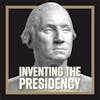The Making of a President
In the early days of June, 1787, in the thick of the Constitutional Convention, a debate unfolded that would test the fate of the young American nation. Four years after the end of the American Revolution, the United States still had no functioning Executive branch. The Convention sought a solution that would eventually create one of the most hallowed institutions of the United States government: the presidency. In this episode, join Rick Atkinson, Dr. Lindsay Chervinsky, Dr. Bruce Ragsdale, Dr. Patrick Spero, and Dr. Peter Kastor to explore the foundations of the American presidency and the first presidential election.
In the early days of June, 1787, in the thick of the Constitutional Convention, a debate unfolded that would test the fate of the young American nation. Four years after the end of the American Revolution, the United States still had no functioning Executive branch. The Convention sought a solution that would eventually create one of the most hallowed institutions of the United States government: the presidency. In this episode, join Rick Atkinson, Dr. Lindsay Chervinsky, Dr. Bruce Ragsdale, Dr. Patrick Spero, and Dr. Peter Kastor to explore the foundations of the American presidency and the first presidential election.
For free videos, lesson plans, and more, click here.
Written and directed by Dr. Anne Fertig. Narrated by Tom Plott with additional voice acting by Matt Mattingly, Dr. James Ambuske, Matt Mattingly, Breck Pappas, and Adam Erby.
Inventing the Presidency is a Production of the Mount Vernon Ladies’ Association and CD Squared Productions.
Further Reading
Primary Sources
Washington’s Writings
[Diary entry: 14 May 1787],” Founders Online, National Archives, https://founders.archives.gov/documents/Washington/01-05-02-0002-0005-0014.
“[Diary entry: 17 September 1787],” Founders Online, National Archives, https://founders.archives.gov/documents/Washington/01-05-02-0002-0009-0017.
“From George Washington to Henry Knox, 1 April 1789,” Founders Online, National Archives, https://founders.archives.gov/documents/Washington/05-02-02-0003.
Records of the Constitutional Convention
The Records of the Federal Convention of 1787, ed. Max Farrand (New Haven: Yale University Press, 1911). Vol. 1.
Madison, James. Notes of Debates in the Federal Convention of 1787. New York: Norton, 1987.
Secondary Sources
Alexander, John K. The Selling of the Constitutional Convention: a History of News Coverage. Madison, WI: Madison House Publishers, 1990.
Ashworth, Marjorie. To Create a Nation: the Constitutional Convention of 1787. The Link Press, 1787
Atkinson, Rick. The British Are Coming: the War for America, Lexington to Princeton, 1775-1777. New York: Henry Holt and Co., 2019.
Chervinsky, Lindsay M. The Cabinet: George Washington and the Creation of an American Institution. Cambridge: Belknap Press, 2020.
Collier, Christopher and James Lincoln Collier. Decision in Philadelphia: the Constitutional Convention of 1787. New York: Random House, 1986.
Independence National Historical Park. 1787: The Day-To-Day Story of the Constitutional Convention. New York: Exeter Books, 1987.
Kastor, Peter. “Washington’s Workforce: Reconstructing the Federal Government at the Moment of Its Creation,” in Washington’s Government: Statebuilding for a New Nation. Max Edling and Peter J. Kastor, eds. Charlottesville: University of Virginia Press, 2021: 57-85.
Ragsdale, Bruce. Washington at the Plow: the Founding Farmer and the Question of Slavery. Cambridge: Belknap Press, 2021.
Ridgway, Whit. “George Washington and the Constitution,” in A Companion to George Washington, Edward G. Lengel, ed. Massachusetts: Wiley-Blackwell, 2012.
Rozell, Mark J, ed. George Washington and the Origins of the American Presidency. Westport, Conn.: Praeger, 2000.
[NARRATOR]
In the early days of June 1787, in the thick of the Constitutional Convention, a debate unfolded that would test the fate of the young American nation.
[CHAIRMAN]
Order! Order! Mr. Randolph. Virginia, you may take the floor.
[RANDOLPH]
I submit for consideration of the committee, a resolution to be included in this new constitution to form an executive branch of the United States.
[CHAIRMAN]
James Wilson, Pennsylvania. You may speak.
[WILSON]
I move that we amend the resolution by adding to the words, An executive branch to consist of a single person.
[CHAIRMAN]
Very well. Does the committee wish to respond? Very well. Should the committee move to put the issue to a vote? Ah, Dr. Franklin.
[FRANKLIN]
This is an issue of great importance. Before we put the issue to a vote, would the gentleman who made the motion like to explain their sentiments?
[WILSON]
I feel a single man would feel the greatest responsibility for the post. And administer the public affairs best. A single head of state would not be interrupted by infighting. It would only serve to enforce the laws put in place by the legislature.
[NARRATOR]
Four years after the end of the American revolution, the United States still had no functioning Executive branch. The convention sought a solution that would eventually create one of the most hallowed institutions of the United States government: the presidency.
And that meant no idea was off the table.
[RANDOLPH]
I am for appointing three persons from three districts of the country to compose the executive. A single person may be considered the fetus of a monarchy.
[WILSON]
On the contrary, unity in the executive, instead of being the fetus of monarchy, would be the best safeguard against tyranny. Among three equal members, I foresee nothing but uncontrolled and violent hostility.
[MADISON]
Perhaps before we decide between one or three people in the executive, it would be better to decide the extent of the executive authority. A definition of the executive's powers would assist the committee. and determining how far these powers might be safely entrusted to one person.
[NARRATOR]
When James Madison suggested to define the extent of the executive powers, he must have known just what a monumental task lay before the convention. These scenes, adapted from first hand accounts of those who attended the convention, unfolded piece by piece over months. The delegates scrutinized, interrogated, and argued every aspect of a would be presidency.
[SHERMAN]
Even in Great Britain, the king has a council.
[WILSON]
A council more often serves to cover up than prevent corruption!
[FRANKLIN]
We should make the office unpaid to prevent men from seeking the office for their personal wealth.
[WILSON]
A veto is essential to check the powers of the legislature.
[SHERMAN]
I am against enabling any one man to stop the will of the whole.
[DICKINSON]
Add that the president may be removable on impeachment and conviction for misconduct or neglect in the execution of his office.
[RANDOLPH]
A president should serve for seven years.
[SHERMAN]
A president should serve for three years.
[MASON]
Stop! We are not indeed creating a British government. But a more dangerous monarchy, an elective one. Do you want to pave the way to hereditary monarchy? Do you flatter yourself that the people will ever agree to this? If you do, I venture to tell them you are mistaken.
[NARRATOR]
The specter of the monarchy loomed over the convention, but after years of ineffective federal administration. Many were frustrated with the status quo, so how would they create this office to prevent it from falling prey to the same abuses as the monarchy? One voice that was silent during this debate was George Washington.
At this point, he was merely president of the convention, not of the United States.
Washington favored a strong executive branch, but he did not wade into the ferocious debates about its powers and limits. Washington, and others in the room, likely knew that whatever decisions were made about the executive branch, he would be chosen to lead it. So Washington watched as agreements and disagreements collected into pressing questions that would define not only his future, but the future of the United States.
What would the powers of a president be? How would the powers of a president be checked? And perhaps most importantly, what is a president? In this podcast, we're exploring George Washington as both president and precedent. From the very origins of the U. S. presidency at the Constitutional Convention to Washington's final warnings in his farewell address, we will break down how one man shaped the presidency and the many times that it could have all fallen apart.
This is Inventing the Presidency, Episode 1: The Making of A president.
[MUSIC]
[NARRATOR]
What is a president? Today, over 60 countries across the world have a president. While a monarch is born into their title, and a prime minister is typically selected by a legislative body, a president is elected by the population of a country. The powers of a president can vary from country to country, but it is typically an office with separate powers from the legislature, although both the president and the legislature may have the ability to check the other's powers.
In the United States, the president oversees foreign diplomacy, appoints high ranking federal positions, and confers with a cabinet of advisors. The president can sign laws passed by the legislature into existence, but can also veto them so that they do not pass. This is the presidency as we understand it today.
But in the 18th century, no nation had a president.
[KASTOR]
There are lots of different presidents in the political realm.
[NARRATOR]
Here is Dr. Peter Kastor, Samuel K. Eddy, Professor of History and American Culture Studies at Washington University in St. Louis.
[KASTOR]
There are presidents like the President of the United States, office holders who have similar duties. There are presidents in other countries that have very different powers, very different duties. Some of them are democratic, some of them are not. But we also encounter presidents in lots of other ways. People are presidents of their high school debating society, they can be presidents of boards of trustees.
It's a title that's used in a lot of different ways. At the time, George Washington became president of the United States. There was only one president in the political sense that we understand it now, and that was him. So let's take the word president and divide it up. The critical term there is preside.
When the Continental Congress came into being, the first and then the second Continental Congresses, these were supposed to be gatherings for representatives, first from the colonies and then from the various states. And frankly, they needed someone to preside over those meetings. And that person would be the president.
[NARRATOR]
It is easy to forget sometimes that behind the myth is a man, a man whose education ended at age 11 and who lost more military battles than he won. A man who was both praised and criticized by the press. A man known for his stoic demeanor and careful deliberation, as much as he was for his temper. A man who fought for liberty, but who over the course of his lifetime, enslaved hundreds of men, women, and children.
Here is Dr. Patrick Spero, Executive Director of the George Washington Presidential Library at Mount Vernon.
[SPERO]
So the thing that I want most people to realize about George Washington is he was not born the commander in chief. He was not born the president. He was not born that marble statue that we all see in our mind.
He was born in a small farm on a river in what was considered a remote part of the British Empire, he had to cut his own path through life. He had to figure out how to navigate a number of challenges and uncertainties throughout his life. I mean, Washington was born into an era of incredible uncertainty.
His entire life was a period of incredible instability and he navigated it.
[NARRATOR]
Let us take a step back to Philadelphia 1787. Four years have passed since the conclusion of the American Revolution. Washington has long since resigned his commission as Commander-in-Chief and has returned to his beloved Mount Vernon.
At this point in time, there is no executive branch and there is no Constitution. The young nation is governed by the Articles of Confederation. The Articles of Confederation were the United States’ first attempt at a constitution. Adopted by the Second Continental Congress in 1777 and ratified in 1781, the article's second clause dictated that any power not specifically delegated to the federal government would revert to each individual state.
With 13 government bodies, it was becoming increasingly clear that the Articles of Confederation We're no longer sufficient to govern a union mounting debt from the war and the inability to negotiate treaties left the new nation vulnerable. Presidential historian Lindsey Chervinsky, author of the cabinet, explains why the Articles of Confederation failed.
[CHERVINSKY]
It failed for a couple of reasons. One, structurally, it required almost unanimous consent to get anything done, and the 13 states agreed on almost nothing. The second problem was that the Confederation Congress was not empowered to levy taxes the way it needed to do, to pull together military forces to defend the nation, to provide the support for diplomacy that was required to manage the United States relationship on the international scene, or to manage tensions and conflicts between the states.
And so what happened is that The states basically split into sections where they had different interests, demands, needs, and they were squabbling with each other, they were arguing with each other, and Congress couldn't really do anything about it, and was totally bankrupt to pay its own debts, to pay the state's debts, or to engage in any sort of diplomatic or military defense efforts.
[PLOTT]
So, in 1787, the states convened a new convention. The goal? To create a new model of government, or, at the very least, to reform the Articles of Confederation. This constitutional convention met in what is now known as Independence Hall in Philadelphia. Every state, except Rhode Island, voted to send delegates to this new convention.
For months they prepared until that fateful day on May 14th, 1787, when the convention was scheduled to begin. The doors opened and almost no one showed up from the diary of George Washington. Monday, May 14th, 1787.
[WASHINGTON]
This being the day appointed for the convention to meet, but only two states being represented, it was agreed to attend at the same place at 11 o'clock tomorrow.
[NARRATOR]
On that first day, only the delegations from Virginia and Pennsylvania had arrived. The second was perhaps unsurprising, considering the Convention's location in Philadelphia. It would take a little more than ten days for a quorum of seven states to be reached. At that point, Washington was merely a delegate, sent to lead the Virginia delegation which included, among others, James Madison, George Mason, and Edmund Randolph.
On May 25th, the convention finally began. On that first day, Robert Morris nominated Washington himself to be the president of the convention. That is, to preside over the debates and discussions that would unfold in the coming weeks. According to James Madison, Benjamin Franklin was said to be The only other serious contender, and had he not been sick that day, he would've nominated Washington himself.
Madison wrote of the occasion.
[MADISON]
General Washington was unanimously elected by ballot and conducted to the chair by Mr. Morris and Mr. Rutledge, from which in a very emphatic manner, he thanked the convention for the honor they had conferred on him, reminded them of the novelty of the scene of business in which he was to act, lamented his want of better qualifications, and claimed the indulgence of the House towards the involuntary errors which his inexperience might occasion.
[NARRATOR]
Progress was slow. The New Hampshire delegation wouldn't even arrive until July. Rhode Island wouldn't send any delegates at all. Behind shuttered windows in the heat of an infamous summer, delegates argued on every point of the new government.
How many delegates should each state receive in the new legislature? Should that number be determined by the population or wealth of the state? And if so, how would the enslaved population figure into those numbers? And what about the powers of the executive branch? They did not want a king. What was it that they did want? Should the country be led by a three member board or by a single head of state?
Lindsay Chervinsky explains the different precedents available to 18th century observers.
[CHERVINSKY]
Washington had a couple of different precedents that he could pull from. Most were examples of things not to do. So the British government is obviously the most obvious choice.
The nation had just fought a war declaring its independence from the British Empire, and that war had ended only six years before Washington's inauguration, so that's really not a very long time. And most Americans still remembered what the British monarchy looked like, how it acted, what were the abuses that they had objected to.
Another example was a little bit closer to home. All of the states had created constitutions after declaring independence, and most of them had gone pretty radically in the opposite direction of the British Empire. And as a result, they tended to have very little power. They tended to be fairly decentralized.
And so that was an example also of how not to act, because many of those constitutions produced governments that were quite inefficient and really didn't get much done. And trying to find that middle ground was tricky, but at least it sort of provided polar opposites.
[NARRATOR]
Washington took his role as president of the convention seriously. He favored a model of government with a strong executive branch led by one single elected leader, but he also hesitated to interfere with the decisions that unfolded during the convention. Since the role of the president was to preside, Washington remained relatively quiet during the debates. Washington may have perceived his role as keeping order rather than influencing debates.
Washington's diaries give us a glimpse into the slow and sometimes tedious progression of the convention. He wrote of long days, endless committees, and postponed debates. But on September 17th, four months after the convention began, he finally wrote about its success.
[WASHINGTON]
Monday, September 17th, 1787. The Constitution received unanimous assent of eleven states, after which I returned to my lodgings. I retired to meditate upon the momentous work which had been executed after not less than five, for a large part of the time, six and sometimes seven hours sitting every day, Sundays and the ten days adjournment to give committee opportunity and time to arrange the business for more than four months.
[NARRATOR]
The first state to ratify this new constitution would be Delaware. Other states quickly followed. New Hampshire became the ninth state to ratify on June 22nd, 1788. And with it, the Constitution became law. Now the real work could begin now, would begin the first presidential election.
[MUSIC]
[NARRATOR]
If you're enjoying inventing the presidency, be sure to check out our other podcast from. The George Washington Podcast Network. Learn about the lives of Sambo Anderson, Ona Judge, Caroline Branham, and others in Intertwined, the Enslaved Community at George Washington's Mount Vernon. Or get up close and personal with Washington's own library in The Secrets of Washington's Archives. Listen on Spotify. Apple, YouTube, or on your favorite podcast app, go to GeorgeWashingtonPodcast.com to learn more.
[PARKER]
Over the course of their lives, George and Martha Washington enslaved more than 577 men, women, and children at Mount Vernon. Some like Sambo Anderson were born in Africa. Many more like Caroline Branham, Frank Lee, Ona Judge, and Davy Gray were born in America. They labored for the Washington's comfort and wealth while building families of their own resisting their enslavement and self-emancipating when the moment was right.
Their lives were intertwined with the Washington's in a story that. Spans across oceans, empires, revolutions, and time in slavery and freedom and life and death. I'm Brenda Parker, and this is Intertwined: The Enslaved Community at George Washington's Mount Vernon. Look for it on Apple podcast, Spotify, Stitcher, or wherever you get your favorite podcast. Learn more at GeorgeWashingtonPodcast.com.
[MUSIC]
[NARRATOR]
The first presidential election took place between December 15th, 1788 and January 1789. Washington never stood for election. He never campaigned for the position. He didn't even volunteer. It would not be until the election of 1800 that presidential candidates would launch formal campaigns.
While loose political factions existed, there were no party politics or official partisan structures yet. Yet, George Washington remains the only president to be unanimously elected by the Electoral College. In some ways, this outcome was unlikely. After all, Washington did not want to be president. When he had resigned his commission as Commander in Chief in 1783, Washington had likely considered his public career over.
He wanted to retire as a private citizen. While Washington had proved himself as a successful commander and a hero in the eyes of his nation, his heart lay At Mount Vernon, his sprawling plantation on the Potomac River, just 20 miles south of what is today Washington, D. C. Mount Vernon was home to Washington, his wife Martha, two young grandchildren, and over 300 enslaved people.
Washington's absence during the war left Mount Vernon in disarray, and it was Washington's intent to spend the rest of his life farming as a private citizen. Bruce Ragsdale. Author of Washington at the Plow and winner of the George Washington Book Prize explains.
[RAGSDALE]
Washington spent more time farming throughout his life than he did either in military service or in political office. And he always said it was the activity that was best suited to his disposition. It was certainly what he most enjoyed. But he also invested it with an enormous public, even civic, purpose, and that was never more true than in the 1780s when he had returned to Mount Vernon after resigning his commission from the Continental Army.
He was probably spending more time farming in those years than he ever had before again in his life, and it made him even more reluctant than he otherwise would have been to leave to accept the presidency.
[NARRATOR]
Despite all this, Washington knew From the moment that the office of president was created, that he would be elected.
Almost everyone in the United States did. In fact, some of those who attended the Constitutional Convention admitted that they had created the role with him.
[CHERVINSKY]
There were no other serious contenders for the presidency. Everyone pretty much understood that once the constitution was ratified and there was going to be one president, then Washington was going to be that president.
First, he had the public service that was required. He had sacrificed for eight years during the war. He had a national stature. As commander in chief, he had traveled up and down the country, and that was something that was relatively rare for Americans at the time. So the fact that a lot of people knew him and knew of him was essential and important.
And lastly, he had proven himself to be trustworthy. He had proven that he could wield enormous power, just gargantuan amount of power, and then give it back and not abuse that said power. And then, of course, at the end of the war, he returned his commission and went home and became known as the American Cincinnatus, the general who returned to his plow.
And that was something that we kind of take that for granted today, but in the course of human history, that is a mind-blowing activity. That is not something that was done. So the fact that this person, who had had so much power, who had sacrificed, who had demonstrated a capacity for leadership, And bringing people together was also trustworthy, was a really unique combination.
[NARRATOR]
Duty and desire thus created a deep conflict for Washington. On April 1st, 1789, on the precipice of the electoral decision, Washington wrote to Secretary of War Henry Knox:
[WASHINGTON]
So unwilling am I, in the evening of a life nearly consumed in public cares to quit a peaceful abode for an Ocean of difficulties…– I am sensible, that I am embarking the voice of my Countrymen and a good name of my own, on this voyage, but what returns will be made for them – Heaven alone can foretell. – Integrity & firmness is all I can promise – these, be the voyage long or short, never shall forsake me although I may be deserted by all men. –
[NARRATOR]
The first election was very different than the elections that we would recognize today.
For one, there was no campaigning. No nomination either. Each elector would have two votes to cast for president. Each state had their own rules for choosing electors. Here's Peter Kastor again.
[KASTOR]
First of all, almost every state had very explicit rules that only white people could be allowed to vote, and more specifically, only white men could vote, and even more specifically, only white men who had a certain amount of property could vote.
And property could mean land, or it could mean property appraised in other ways. So someone living in a city who didn't own land But who owned a house and had money in other forms might have access to suffrage. And then when these voters went to the polls, they were not voting for a president. They were voting for electors.
The electoral college affirmed from the start the assumption, everyone seemed to assume that the electoral college should affirm the popular majority, but how those electors actually went about their business. Again, it varied from state to state.
[NARRATOR]
In some states. Electors were decided by popular vote. In others, the legislature appointed the electors. Not all of the states even voted. New York was unable to decide how to choose their electors, and North Carolina and Rhode Island hadn't ratified the Constitution yet. Four electors chose to abstain. The first electors convened on February 4, 1789. But once again, it would not be until April that enough state representatives would gather to reach a quorum.
At that point, each elector casts two votes for president. The one with the most votes would win, and the runner up would assume the role of vice president.
On April 6, 1789, 69 electors from 10 states cast their votes. 35 votes were needed to be elected. Washington won all 69.
With Washington's unanimous election, the country now had its first president.
But what exactly did that mean? Surely, Washington could not simply preside in the way that he had at the Constitutional Convention, but the document produced by that body provided surprisingly little guidance.
While Article I of the Constitution comprises of ten sections outlining the powers and limits of the legislature, Article II only contains four brief sections on the roles and duties of the President. A President could make treaties with foreign powers, so long as he had the approval of Congress. A President could appoint ambassadors, judges, and other federal positions. A President would lead the military as Commander in Chief. A president would also, from time to time, advise Congress on the state of the Union.
But what did it mean to take advice from the Senate? Or to give advice for that matter? Would he give advice in person or deliver it in a letter? At what point did advice end and action begin? Would Washington attend legislative sessions or should he keep his distance to avoid seeming too controlling?
And how often was time to time? Provide advice too frequently and a president may appear over involved in legislative affairs. too infrequently, and they may seem negligent of their duties. Another example hit a bit closer to home, that of a monarchy. By this point, Britain itself was operating as a constitutional monarchy.
This means that it is governed primarily by a parliament. The executive, in this case, might be considered a king or queen. Americans were wary of this system, and rightfully so. The lack of term limits meant that a monarch was ruler for life.
It was also a considerably expensive form of government. European monarchs traditionally expressed their strength visually and socially through extravagant lifestyles and celebrations. But there was one president that Washington knew quite well.
[CHERVINSKY]
Washington, like all humans, was shaped by what he had done prior. And prior to serving as president, he had been the commander in chief of the Continental Army for eight years.
And the practices that he developed of how to work with Congress, how to manage fractious, sometimes disagreeable, very egotistical opinionated officers, how to hold them all together and hear their different opinions, how to manage those personalities and get them to work towards a common cause that had worked well for him.
And so he often drew on what he had done well previously and brought them into the presidency.
[NARRATOR]
Rick Atkinson. Pulitzer Prize winning author of The British Are Coming, The War for America, Lexington to Princeton, 1775 to 1777, explains Washington's military leadership.
[ATKINSON]
Washington in the first year of his tenure as commander in chief says, and I think it's in early 1777, he writes that a people unused to restraint must be led.
They will not be drove. That's an extraordinary insight, I think, for someone who aspires to lead the American people. It's something that he has picked up fairly quickly as Commander in Chief. It's a recognition of the fractious nature of the Americans, and it's a recognition of the approach that's necessary in order to be successful, first as a general and ultimately as a political leader.
[NARRATOR]
But there are differences as well between a president as well.
[ATKINSON]
And a general one that Washington is careful to navigate as a general. Washington was able to be directive, as they say in the military, he could give orders and he could expect those orders to be obeyed or there would be severe consequences as president.
He does not have the military code of justice behind him. He cannot be directive in the same way. He cannot give orders in the same fashion that he was accustomed to for eight years as commander in chief of the Continental Army. And so there is a political component of it that if you are trying to achieve a certain goal, a political goal, an administrative goal, as president, you've got to have alternatives to simply saying this must be done because I say so.
[NARRATOR]
So what was George Washington's presidential leadership style? The answer is, it changed over time. At the beginning, Washington would take a more reserved stance towards the presidency, for fear of overstepping the untested limits put forward in the Constitution. But, as his presidency progressed, and as the United States faced more challenges from both Inside and outside its borders, Washington found himself asserting the powers of the executive branch in ways that would forever shape the young nation.
In hindsight, it might be easy to overlook the momentous task that lay ahead of Washington, or to believe that his success was inevitable. But Washington knew one misstep could weaken, or even collapse, the fledgling government.
[RAGSDALE]
I think Washington's most important accomplishment, and his most important legacy, is that no matter what Washington was involved with, whether it was in military, whether it was in politics, and especially when it was in agriculture, was that he was always looking at something larger than his immediate interests.
He was always looking about the impact on this nation that he envisioned from a very early point, even before, he's talking about a rising empire even before the Revolutionary War. And so he always saw that. Even his personal choices as a farmer or as a manager of an estate had implications for the future of the United States and nothing is more important to Washington than the future of the United States.
[NARRATOR]
Next time on Inventing the Presidency, President George Washington is inaugurated and the job begins.
[MOATS]
How do you strike that balance between accessibility and also dignity? And you know, he's a formal, serious guy, and how do you do that? Obviously he's not a king, he's not a monarch, and that connection between him and the citizenry are so important.
[NARRATOR]
But before the United States can break in their new president, almost lose him.
[GEORGINI]
Washington is so ill. He nearly dies twice his first year in office. And every moment that Washington shows some sign of personal physical weakness, Adams is terrified because he knows he will have to step into that role at a moment's notice.
[NARRATOR]
Inventing the Presidency is a production of the Mount Vernon Ladies Association and CD Squared Productions. This episode was written and directed by Dr. Anne Fertig. Audio production was done by Curt Dahl of CD Squared Productions. Production assistant was Jacob Cameron. Narration by Tom Plott. With additional voice acting by Dan Shippey, Dr. James Ambuske, Adam Erby, Breck Pappas, and Matt Mattingly. Additional fact checking was performed by Dr. Alexandra Montgomery, Manager of the Center for Digital History, and Samantha Snyder, Research Librarian at the George Washington Presidential Library. Our logo was designed by Kaitlyn Prange. We would like to thank our contributing scholars to this episode, Rick Atkinson, Dr. Patrick SpEro, Dr. Lindsay Chervinsky, Dr. Peter Kastor, and Dr. Bruce Ragsdale.
To hear more great podcasts from Mount Vernon and the George Washington Presidential Library, visit GeorgeWashingtonPodcast.com or go to www.mountvernon.org.
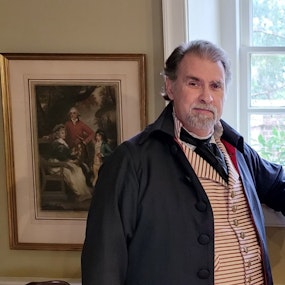
Tom Plott
Manager of Character Interpretation
Tom Plott – Tom has worked in professional theatre for over 35 years as an actor, director, fight choreographer, and vocal talent. He is the Manager of Character Interpretation at George Washington’s Mount Vernon. Tom has made a career of portraying historical characters; from Shakespeare to Da Vinci to John Wilkes Booth. His voiceover credits include narrating the Discovery Channel documentary Lightening Weapon of the Gods. He now uses his versatility and skills as a researcher to depict George Washington’s personal physician Doctor James Craik, the first Physician General of the United States.
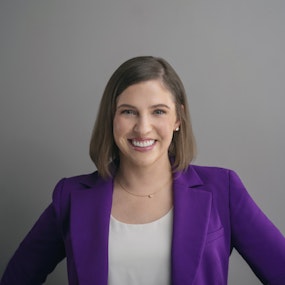
Dr. Lindsay M. Chervinsky
Presidential historian
Dr. Lindsay M. Chervinsky is a Senior Fellow at the Center for Presidential History at Southern Methodist University. Dr. Chervinsky is the author of the award-winning book, The Cabinet: George Washington and the Creation of an American Institution, co-editor of Mourning the Presidents: Loss and Legacy in American Culture, and the forthcoming book, Making the Presidency: John Adams and the Precedents That Forged the Republic. She regularly writes for public audiences in the Wall Street Journal, Ms. Magazine, The Daily Beast, The Bulwark, Time Magazine, USA Today, CNN, and the Washington Post, and regularly offers insight on tv, radio, and podcasts.
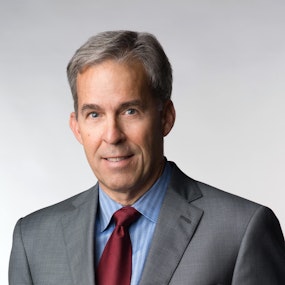
Rick Atkinson
author
Rick Atkinson is the bestselling author of the Liberation Trilogy--An Army at Dawn, The Day of Battle, and The Guns at Last Light--as well as The Long Gray Line and other books. His is currently writing the Revolution Trilogy, which began with The British Are Coming. His many awards include Pulitzer prizes for history and journalism. A former staff writer and senior editor at The Washington Post, he lives in Washington, D.C.
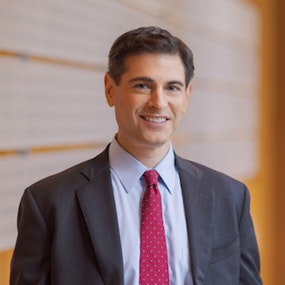
Patrick Spero
Executive Director
Patrick Spero, Ph.D., is the Executive Director of the George Washington Presidential Library. Prior to his current role, he served as Librarian and Director of the Library & Museum of the American Philosophical Society (APS) in Philadelphia. Previously, Spero served on the faculty of Williams College, teaching courses on the American Presidency, the American Revolution, early American history, and political leadership.
Spero is the author of Frontier Country: The Politics of War in Early Pennsylvania, Frontier Rebels: The Fight for Independence in the American West, and the forthcoming The Scientist Turned Spy: Andre Michaux, Thomas Jefferson, and the Conspiracy of 1793 and co-editor of The American Revolution Reborn: New Perspectives for the 21st Century.
In recognition of his scholarly and administrative accomplishments, he is an elected member of the Royal Historical Society (2023), the Academy of Arts in Science in Lyon, France (2023), the American Philosophical Society (2023), and the American Antiquarian Society (2023).
Spero received his BA from James Madison University and his Ph.D. from the University of Pennsylvania.
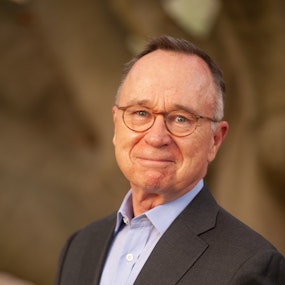
Bruce Ragsdale
Author
Bruce Ragsdale is the author of Washington at the Plow: The Founding Farmer and the Question of Slavery, which won the George Washington Prize in 2022. He was a fellow at the Washington Library and the International Center for Jefferson Studies, and he was Mount Vernon’s inaugural fellow with the Georgian Papers Programme. Ragsdale formerly served as the director of the Federal Judicial History Office at the Federal Judicial Center. He received his Ph.D. from the University of Virginia.
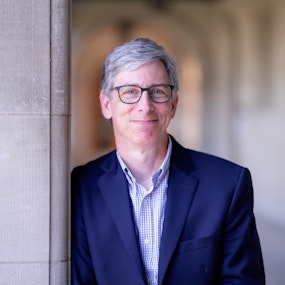
Peter Kastor
Samuel K. Eddy Professor, Washington University in St. Louis
Peter Kastor is a professor of history and American culture studies at Washington University in St. Louis, where he is the inaugural Samuel K. Eddy Professor and Associate Vice Dean of Research in Arts & Sciences. He studies the politics of the early American republic and the long history of the American Presidency. He is the author or editor of eight books, along with numerous articles and essays.
In addition to his academic writing, he has been a regular guest on St. Louis Public Radio and has written for outlets including The Washington Post, The Huffington Post, The Conversation, and Fortune. Two of his courses have been featured on C-SPAN’s Lectures in History. In addition to participating in Washington University’s Brookings Executive Education, which provides ongoing career development for emerging leaders in the federal government, he has contributed to professional development programming for groups including the St. Louis Public Schools, the National Geospatial Intelligence Agency, and the Air War College. An active contributor to numerous local organizations, he is currently vice chair of the board of trustees at the Missouri Historical Society.
Professor Kastor is a former Digital Innovation Fellow at the American Council of Learned Societies and is now a TGI associate at the Taylor Geospatial Institute. He is currently completing a major digital project that that reconstructs the early federal workforce.
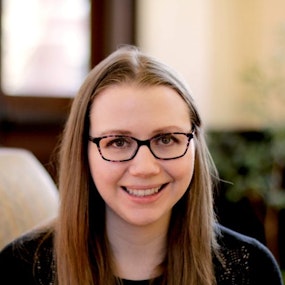
Anne Fertig, PhD
Writer | Director | Producer
Anne Fertig is the Digital Projects Editor at the Center for Digital History at the George Washington Presidential Library and the lead producer of the George Washington Podcast Network. Dr. Fertig completed her Ph.D. in English and Comparative Literature at the University of North Carolina at Chapel Hill in 2022. In addition to her work at the George Washington Podcast Network, she is the founder and co-director of Jane Austen & Co.
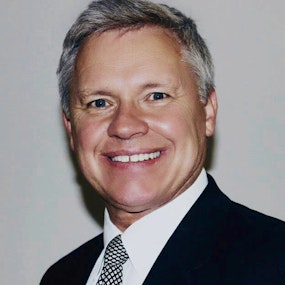
Curt Dahl
Audio Producer
Curt has been the recipient of scores of prestigious awards throughout his career including the Clio, the Mobius, the Telly, the Silver Microphone, the New York Festival Award, the Aurora, the Gabriel, the Addy, the Cine Golden Eagle, the Andy, the Hall of Fame Award from Families Supporting Adoption, and the Bronze Lion at the Cannes Film Festival. "Waterfight", a public service announcement Curt wrote and produced was listed in Random House's "100 Best Television Commercials and Why They Worked."
New to Inventing the Presidency?
Here are some great episodes to start with. Or, check out episodes by topic.




















